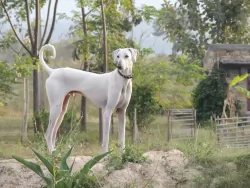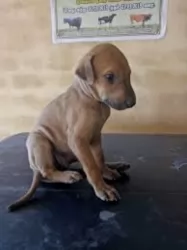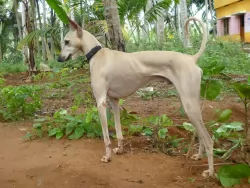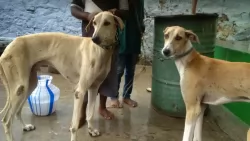 MyDogBreeds
MyDogBreeds Chippiparai is originated from India but Boston Terrier is originated from United States. Chippiparai may grow 20 cm / 8 inches higher than Boston Terrier. Chippiparai may weigh 9 kg / 20 pounds more than Boston Terrier. Both Chippiparai and Boston Terrier has almost same life span. Both Chippiparai and Boston Terrier has same litter size. Both Chippiparai and Boston Terrier requires Low maintenance.
Chippiparai is originated from India but Boston Terrier is originated from United States. Chippiparai may grow 20 cm / 8 inches higher than Boston Terrier. Chippiparai may weigh 9 kg / 20 pounds more than Boston Terrier. Both Chippiparai and Boston Terrier has almost same life span. Both Chippiparai and Boston Terrier has same litter size. Both Chippiparai and Boston Terrier requires Low maintenance.
 The Chippiparai is a working dog found in India and until recently there has been little interest in the purity of any breed, but rather only an emphasis on the abilities of the dog. They are only beginning to research the origin and history of their native dogs such as the Chippiparai. Not much is known about the origin of the breed except that it is found almost exclusively in Tamil Nadu and Keraia in the southern part of the subcontinent of India. Other than this there is much speculation about the breed’s origin but very little-known facts. It is indeed an ancient breed; however, its origin could be thousands of years ago or simply hundreds of years ago.
The Chippiparai is a working dog found in India and until recently there has been little interest in the purity of any breed, but rather only an emphasis on the abilities of the dog. They are only beginning to research the origin and history of their native dogs such as the Chippiparai. Not much is known about the origin of the breed except that it is found almost exclusively in Tamil Nadu and Keraia in the southern part of the subcontinent of India. Other than this there is much speculation about the breed’s origin but very little-known facts. It is indeed an ancient breed; however, its origin could be thousands of years ago or simply hundreds of years ago.
• Perhaps it is a descendant of the Saluki as it resembles this breed quite a bit. It has been believed for some time that the Saluki is the original sighthound and the source of all sighthound breeds. The Saluki was very popular in the Middle East, especially in Persia and Arabia from which it could easily have spread to India. It would then have been shared from Northern India to Southern India where the Chippiparai is found.
• Perhaps the Chippiparai is a descendent of sighthounds from Central Asia and Afghanistan – the Tazi, Taigan, Hortaya Borsaya or the Afghan Hound. This part of Central Asia had more trade, influence and contact with the Indian subcontinent early in their history than with any other region. The Chippiparai is considered by some to be more like these sighthounds than like the Saluki and the interaction between these regions has a much longer history than the Middle East and India.
• It is also speculated that the Chippiparai might have been developed completely and uniquely from the local street and working dogs. With the civilization of India being one of the oldest in the world, it is considered a possibility that the Chippiparai is the descendent of the Harappan hunting dogs that probably were developed by the Indus Valley or Harappa roiling class.
Wherever the Chippiparai came from, they were the exclusive property of the wealthy and ruling castes. These upper castes were the only ones that could legally hunt with dogs or afford to feed one. The royal classes of Tiruneivell, Thanjavur, and Madurai all fed the popularity of the breed among the upper castes. They were coursing dogs used to chase down the prey once it was sighted. The Chippiparai are incredibly fast runners and would catch almost any prey and either hold it or kill it for their hunter. The Chippiparai, when not hunting, had to be chained so they would not chase any small animal that they saw. This confinement also added to the purity of the breed as random breeding was prevented.
The southern part of the Indian subcontinent is extremely hot with routine temperatures over 100’. The Chippiparai was developed to withstand these extreme temperatures and is more heat tolerant than most any other breed. They also need very little food and are resistant to the many parasites and diseases found in southern India.
Harboring the belief that Indian dogs were not as good as European ones, the occupying countries of Portugal, France, and Britain, had no interest in the Chippiparai, again leaving the breed to develop naturally on their own with little or no interbreeding. They also received no formal recognition because Indian culture only valued the dog for its working abilities. There was no Indian Kennel Club until 1956.
The Chippiparai is now very rarely and only found in the area of its birth. Many believe the breed is in danger of becoming extinct and even though it is now registered with Indian Kennel Clubs it is not often shown in their dog shows. Lovers of the breed are now attempting to get Indians to recognize that the Chippiparai is a great companion animal and attempting to save the breed.
 Nicknamed the American Gentleman, the Boston Terrier is the result of crossing the British Bulldog with the white English Terrier. At first the Boston Terrier was bred to be a fighting dog, but since then, undesirable characteristics have been bred out and today the Boston Terrier is regarded as an indoor dog that doesn’t tolerate extreme weather conditions.
Nicknamed the American Gentleman, the Boston Terrier is the result of crossing the British Bulldog with the white English Terrier. At first the Boston Terrier was bred to be a fighting dog, but since then, undesirable characteristics have been bred out and today the Boston Terrier is regarded as an indoor dog that doesn’t tolerate extreme weather conditions.
The breed emerged in the 1870s when Robert Hooper from Boston bought a dog thought to be a mix of a Terrier and Bull type lineage. A specialist breed club was formed in 1891 and in 1979 the commonwealth of Massachusetts named the Boston Terrier the Official State Dog. By the 20th century, the breed’s color and patterns were standard and an essential feature.
 The Chippiparai is a typical sighthound although their size and appearance will vary more than that of registered purebred sighthounds. Typically, they will have a long, domed head with small erect ears and dark eyes. Their muzzle will be as deep and wide as the skull but longer. Their legs are straight and long, their chest is roached back and deep, giving them, an appearance very similar to a greyhound or other sighthound.
The Chippiparai is a typical sighthound although their size and appearance will vary more than that of registered purebred sighthounds. Typically, they will have a long, domed head with small erect ears and dark eyes. Their muzzle will be as deep and wide as the skull but longer. Their legs are straight and long, their chest is roached back and deep, giving them, an appearance very similar to a greyhound or other sighthound.
They have a long curly tail, and their coat can vary greatly in color. They are medium sized, and their coat is short, shiny and close. He is very slender and sleek, which along with his long legs gives him that incredible speed. They are thin with visible ribs.
 The Boston Terrier is a lively, strong-willed breed with an alert expression and fairly large, erect ears. He is a small to medium sized dog and his square muzzle puts him among the Bull breeds.
The dog is compact in build and varies quite significantly in size. Weight with the dog is actually divided into 3 categories – lightweight (under 6.8kg), middleweight (up to 9kg) and the heavyweights being between 9.1kg and up to 11.4kg. The Boston has a short head and a naturally short, low-set tail. The coat is short and smooth, and the colour can be brindle with white markings, brown and white or black and white.
The Boston Terrier is a lively, strong-willed breed with an alert expression and fairly large, erect ears. He is a small to medium sized dog and his square muzzle puts him among the Bull breeds.
The dog is compact in build and varies quite significantly in size. Weight with the dog is actually divided into 3 categories – lightweight (under 6.8kg), middleweight (up to 9kg) and the heavyweights being between 9.1kg and up to 11.4kg. The Boston has a short head and a naturally short, low-set tail. The coat is short and smooth, and the colour can be brindle with white markings, brown and white or black and white.
It’s the energetic liveliness of the Boston Terrier that makes him such a lovable and popular pet. He has an affectionate, gentle nature that makes him a fantastic family pet and he gets on well with children and pets in the home. He can adapt to city or country life. One or two interesting facts of this breed are -
with his short nose, he is prone to drool and snore
he is prone to corneal ulcers because of his large, somewhat protruding eyes
with a small pelvis, the females often battle with the birthing process and may require a caesarean section.
 The Chippiparai is a loving, gentle family dog if well socialized, well trained and well exercised. They are very intelligent and need human companionship. Once they are living with a human family, they are very protective of that family. They are for the most part peaceful and quiet dogs. They are loyal and loving but they are not overly affectionate. Cuddlers they are not, and they do not like to play rough with children.
The Chippiparai is a loving, gentle family dog if well socialized, well trained and well exercised. They are very intelligent and need human companionship. Once they are living with a human family, they are very protective of that family. They are for the most part peaceful and quiet dogs. They are loyal and loving but they are not overly affectionate. Cuddlers they are not, and they do not like to play rough with children.
Accepting and loving within the family, the Chippiparai are equally hesitant and shy around strangers. They can be suspicious, but they are not aggressive. They are just very aloof with strangers, yet they hardly ever bark.
 The Boston Terrier is such a sweet little dog, but you can’t really say what your puppy’s personality will be as personality varies quite a bit between individual Boston’s. Remember that just like with a human child, your puppy will turn out with characteristics that can be attributed to the way he was raised. The Boston just loves his human family and he wants to be part of all your activities, even though he may gravitate towards one favorite family member.
The Boston Terrier is such a sweet little dog, but you can’t really say what your puppy’s personality will be as personality varies quite a bit between individual Boston’s. Remember that just like with a human child, your puppy will turn out with characteristics that can be attributed to the way he was raised. The Boston just loves his human family and he wants to be part of all your activities, even though he may gravitate towards one favorite family member.
Your Boston is a Terrier and that means he is full of life and will require being exercised by you. He can’t just be left outdoors day after day because this is one particular breed that can’t adapt to changing weather conditions. He likes being inside where the temperature is more even. Look after your Boston, because if you do, you’ll be rewarded by having one of the best friends you’ve ever had.
 There are no clinical studies regarding the health and health history of the Chippiparai, so little is known about their long-term health. However, most who know the breed, believe it is an incredibly healthy one. They seem to have a lot less genetically transmitted health issues than other purebreds. Because of their isolation for centuries in India, they have developed immunities and resistance to most parasites and diseases other dog suffer from.
There are no clinical studies regarding the health and health history of the Chippiparai, so little is known about their long-term health. However, most who know the breed, believe it is an incredibly healthy one. They seem to have a lot less genetically transmitted health issues than other purebreds. Because of their isolation for centuries in India, they have developed immunities and resistance to most parasites and diseases other dog suffer from.
Because of this you should look for the types of issues that occur in dogs of this size and build. Have them tested by the Canine Eye Registration Foundation and the Orthopedic Foundation for Animals.
 Boston Terriers are generally healthy, feisty little dogs but it is always wise to know that you may well come across some health conditions that can affect your pet.
Boston Terriers are generally healthy, feisty little dogs but it is always wise to know that you may well come across some health conditions that can affect your pet.
Your Boston may well have to contend with cataracts, and in the dog world, this isn’t only an ailment for old dogs. Juvenile cataracts can develop in young puppies already. Cherry Eye is another eye problem with a prolapse of the gland of the third eyelid. It is also an eye disease than can be found in young dog of less than a year old.
Boston Terriers actually have a fairly high incidence of deafness in one or both ears. White Bostons tend to produce more puppies with deafness.
The Boston Terrier is a brachycephalic dog and therefore more predisposed to Brachyphalic Syndrome where the dog battles to breathe because of too much soft tissue which forms in the airways.
To avoid many dog diseases with your Boston, buy your puppy from a reputable dog breeder who screens dogs used in a breeding program as this prevents puppies inheriting genetic disorders.
 Do not overfeed your Chippiparai. Feed twice a day and no more than a total of 2.5 cups of high quality dry food.
Do not overfeed your Chippiparai. Feed twice a day and no more than a total of 2.5 cups of high quality dry food.
As mentioned previously the Chippiparai seems to have no genetic diseases or issues and very few acquired ones. However, he is sensitive to anesthesia and some foods. He is intolerant to cold weather and has a hard time with his pads on hard surfaces. Some Chippiparai might experience some of the ailments other breeds like them experience.
Both Elbow and hip are possible. This can cause arthritis and lameness. This occurs when the bone does not fit well into the joint.
This can cause lameness as well. The kneecaps slide over the knee instead of staying in place.
This is a hunting dog and he will want to hunt. They are incredibly fast and need the opportunity to run. Brisk walks will not be enough for this dog. He is very energetic. They will chase any small animals. It is not recommended that you have small pets even small dogs or cats with a Chippiparai. Having been bred for centuries to hunt, they are not likely to respond to any commands if they are off lease and chasing prey. Do not allow them to be off leash unless in a fenced area, and that fence needs to be 8 feet tall as they can easily jump a seven-foot fence. Try they at coursing, agility, fly ball and frisbee competitions.
 The Boston Terrier is a lively dog, and even though he doesn't have any extreme exercise requirements, he will still require you exercising him by taking him on walks, or having ball games with him. As an essentially indoor dog, he can even enjoy some quieter indoor games.
The Boston Terrier is a lively dog, and even though he doesn't have any extreme exercise requirements, he will still require you exercising him by taking him on walks, or having ball games with him. As an essentially indoor dog, he can even enjoy some quieter indoor games.
You’ll be able to gauge how much your pet requires in terms of high quality food, but by the time he is an adult, he usually has one or two bowls of food a day. Size and age play an important role in determining his eating habits. Home made foods made up of rice, meat and vegetables are always welcome for your pet and these can be added into his top quality commercially produced dog food. For a healthy dog who is free of skin problems include some raw meat in the diet from time to time. Always make sure that there is a bowl of fresh, cool water which is available 24/7.
With his short coat, the Boston Terrier isn’t a heavy shedder and is low maintenance in terms of keeping his coat groomed. Brush him at least twice a week to remove loose hairs and to also prevent flea and tick infestations. Brush his teeth 2 or 3 times a week to ensure no plaque build-up which can damage the teeth. Never use human toothpaste, but invest in special toothpaste and -brush for dogs. If he is essentially an indoor dog, you may have to get the vet to trim his nails too.